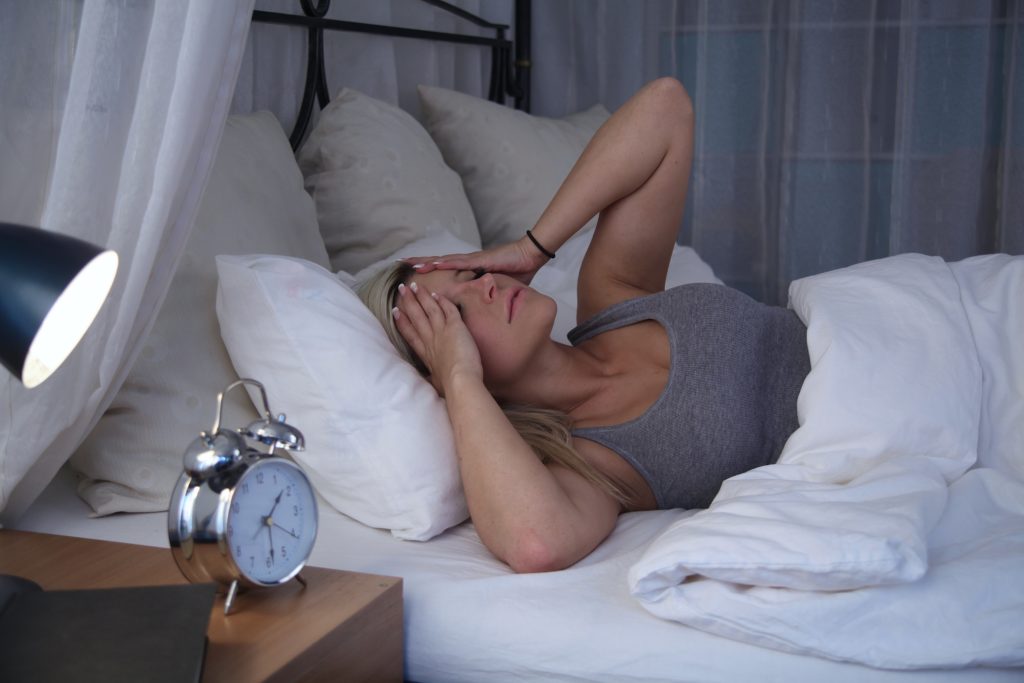Talking in sleep – causes and counter-measures
Talking in your sleep (Somniloquie) is a phenomenon whose causes are not explored completely. Affected during sleep, either individual words or Sounds or phrases of what it is for observers a extremely fascinating. In ancient times, as well as in the middle ages it was believed that the sleep ends communicate with Somniloquie with the gods, and future to predict or divine wisdom preisgäben. Accordingly, the above was written, often even lower. What is actually behind-the-Talking in your sleep, tells you our contribution to this topic.
Table of contents
- Psychotherapy
- Relaxation measures
- Diet
- Naturopathy
Definition
As Somniloquie the medicine, conversations, words and utterances that occur on the Affected, mostly during the REM Phase, so that phase of sleep in which we have the most dreams. Occasionally the phenomenon can, however, also in phases of Non-REM sleep and when switching between the different sleep phases can be observed.
In the age of the child, such a sleep problems occur in approximately 50 percent of all Three – to ten-year-old. However, the Talk in their sleep is lost normally in the course of puberty, which is why in adulthood, only about Five percent of all people have a Somniloquie. Men are affected more often than women. The phenomenon is considered to be rather harmless variant of the insomnia (sleep disorders), and here especially the so-called Parasomnias. Details can be found in our special contribution to the subject of sleep problems.

If Talking in your sleep is Affected, no health hazards, so the sleep can be talks for a Partner but a heavy burden and – as the snoring – by sleep disorders on the lives of partners. Members of the puzzles are often about the meaning, or the well-being of the partner or try to decipher the Spoken word at night, because the words and phrases are often muttered. Because the speech muscles do not SAG during sleep, so that a clear pronunciation is often possible. The nightly disturbances lead to marriage and life partners, so, not infrequently, too little restful sleep, which can strain the relationship. In addition, night sleep talks occasionally give also evidence of present mental stress, or other health complaints.
Causes
As already mentioned, it is not clarified the exact causes for Somniloquie yet finally. In any case, however, there are several factors that encourage the Talk in your sleep:
- Hereditary factors: It seems to be backed up, that Somniloquie has often familial clusters. Consequently, the probability that the children tend to be higher, if one or both parents speak the parts in your sleep. This does not mean, however, that this sleep phenomenon can not occur without certain familial dispositions.
- Emotional stress: whether Stress in everyday life, unresolved emotional trauma, or inner Fears and Worries – the possible reasons for psychological stress, which is why people talk in their sleep, are versatile. The Somniloquie here is closely connected with the processing of sensations, during the day, or in moments of traumatic experiences is collected. The phenomenon lasts usually until the emotional conflict is resolved.
- Lucid dreams: If the Somniloque in REM sleep or in the Transition from a Phase of Non-REM sleep in the REM occurs sleep, can be a sleep talks is also an expression of vivid dreams. The dream said it out loud and convert that is why using the sleep or movements in sleep comparable.
- Narcotic influence: As a particularly favourable factor in the influence of alcohol is considered to be. The drug generally, it contributes to a number of sleep disorders, including snoring, bed-wetting and nightmares. Also, the Talking in your sleep happens in the case of persons who regularly, and also a lot of alcohol to consume, relatively often. The same is true for other intoxicants and, in particular, in the case of the intake of chemical drugs. Consequently, Somniloquie addiction may, in some cases, a pronounced alcohol or drug abuse notes.
- Other causes: fever or febrile diseases, as well as in combination with the Somniloquie occurring in other sleep disorders can encourage Talk in your sleep. Those Affected, for example, at the same time and nightmares, this can lead to shock-induced Cry out in your sleep.

Accompanying symptoms
The accompanying symptoms are when you Talk in your sleep significantly from the underlying causes. Due to illness, or even at the same time nightmares are:
- Sweats,
- High blood pressure,
- or heart palpitations conceivable.
Different Moods, for example sadness or extreme joy that can accompany the Somniloquie, depending on the dream happen.
In the case of marriage and life partners, who sleep with the Affected in the same bed, the sleep disorder also, some of the side effects. For example, you are the nightly disturbances during the day often tired and irritable. The Somniloquie longer and is particularly pronounced, this can lead to the Partner permanently to insomnia and sleep disorders – with the following accompanying symptoms:
- Fatigue,
- Eyes rings,
- Mood swings and easy irritability,
- Heart and circulatory complaints
- Concentration and coordination disorders,
- Headache,
- Loss of power,
- Disturbances in the sleep-Wake rhythm.
- Tagmüdigkeit.
In this way, Somniloquie can be, even if it has taken no disease value, to an enormous strain on a relationship, which is why it is advisable if symptoms persist, consult a doctor.
Diagnosis
The diagnosis is made in most cases by family members, the witness of speaking in your sleep. More Details on the extent and possible causes of the sleep disorder, a visit to the sleep laboratory to days usually brings. Starting with a sleep questionnaire, the patient may also of its partners – information on the frequency and characteristics of sleep disorders and potential health complaints and accompanying symptoms are noted as first guesses to the causes and the extent of the Somniloquie. Specifically, information about the charge for the Partner to show whether a treatment is necessary or not. In addition, a patient survey (medical history) often helps.
Following the initial Interview, a study of Sleep patterns by means of special methods, such as electroencephalography (EEG), the electrocardiogram (ECG) or the camera surveillance. The Patient and, if applicable, also the partners are connected to this purpose, overnight under real sleeping conditions to the corresponding device or during sleep filmed. In this way, sleep can be recorded accurately and the individual points in time at which the Somniloquie, are recorded. As revealed by the Monitoring, possibly accompanying sleep disorders such as snoring or nightmares. In the case of a concrete suspicion, such as alcohol consumption or drug abuse, are also laboratory studies of the blood picture normal.
Therapy
In most cases, the Talk must not be treated in the sleep separately. Are causes, however, specific dangers for the patient’s health or impair the Somniloquie a peaceful coexistence with the Partner, but are targeted measures of treatment is quite conceivable. The Option is then listed therapy approaches are
Psychotherapy
Mental stress in the Form of not should trauma for the Somniloquie worked to be responsible, it is important that those in talk therapy to address. Also, any relationship conflicts that arise from the lack of sleep or the worry of the partner, can be addressed. In some cases, a specialized therapeutic hypnosis helps against sleep disorders.
Stress in everyday life can also be a case for psycho-therapeutic behavior training. Similar to traumatic experiences Stress sometimes requires medical assistance to end the Situation. Correct behaviour in dealing with stress to learning situations, and can therefore contribute to the reduction of sleep disorders.

Relaxation measures
To calm the thoughts before you fall Asleep by appropriate private actions to reduce the risk of nightmares and violent dreams, has in the treatment of Somniloquie also a high priority. Targeted relaxation measures, such as, for example, by
- autogenic Training,
- relaxing massages,
- Meditation,
- Qi Gong,
- or Yoga
be taught, help to reduce stress in everyday life and further treatment are therefore an option. Self-singing bowl therapies some people more help here. The same applies for slight movement therapies in the Form of relaxing walks, the best way to run through the calming nature or forest environments. During exercise, a measured approach is required, because in extreme sports increases the secretion of stimulant stress hormones, such as adrenaline and norepinephrine, which can interfere with a peaceful night’s sleep unless the Sport is directly exercised before going to bed.
Furthermore, relaxation in the private area can also be targeted by stress-free everyday planning and solid sleep rituals promote. In particular, hectic, and for the spirit disturbing activities, such as Watching lurid Horror or action movies, Playing Computer and console games, as well as the Listening to loud and aggressive music before going to sleep, is for many people a Somniloquie of favourable factor, if the sleep disorder is already present.
Diet
You do without as a Patient with Somniloquie best on excessive alcohol consumption, if you are eager to make your night even talks to an end. Also, it should be consumed in the last hours before bedtime has no hard-to-digest food, since this can keep the gastro-intestinal tract, as well as the brain in chess. Also coffee and Energy Drinks with their stimulants to avoid properties. Instead, a Cup of hot tea, or the tried and true glass of warm milk with honey is recommended.
Naturopathy
In terms of nature’s pharmacy Somniloquie mainly by a relaxing aroma therapy and soothing herbal teas look. Suitable to make herbal tea for a peaceful night’s sleep in this regard are, in particular,
- Valerian,
- Hops,
- Lavender,
- Melissa
- and passion flower.
To aromatherapy besides essential Oils of benzoin, frankincense and Ylang-Ylang can be used – stress-related sleep disorders respond commonly to both methods of treatment very well.(ma)
